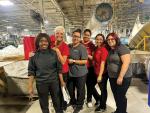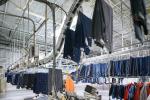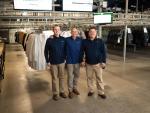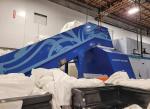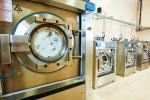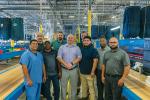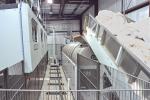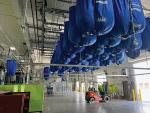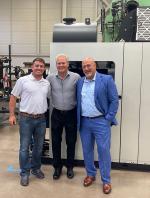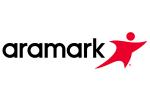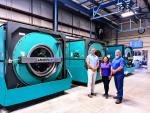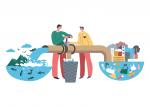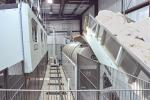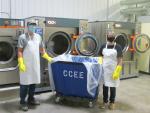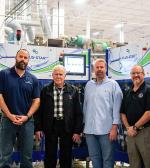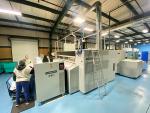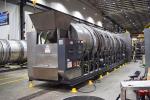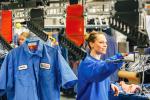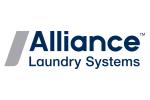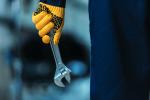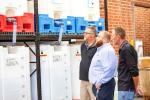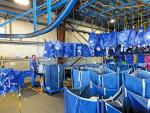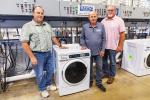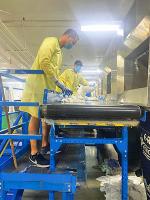Textile/Uniform Rental: W. Kirby Wagg, Performance Matters, Sarasota, Fla.

“We tend to overestimate the effect of a technology in the short run and underestimate the effect in the long run,” is a phrase that has become known as Amara’s law.
Indeed, just because something is overhyped doesn’t mean it is going to be the next best solution for the industrial laundry industry.
When new technology (usually radical) first arrives, naturally people are a bit crazy for it, speculating about all the possibilities.
Its rapid adoption is often overstated—at first. Over time, the changes may be more dramatic than we ever expected.
AI can monitor machine performance and proactively identify maintenance needs, minimizing downtime and expensive repairs. These cost-saving measures will contribute to the long-term sustainability and profitability of laundry businesses.
Artificial intelligence can help identify transportation routes and modes that are most cost-effective, optimizing transportation networks, improving efficiency and reducing costs.
AI accident prevention systems typically consist of several components that work together to detect potential hazards and prevent accidents.
Will this work for our industry? There are disadvantages that I can see in high start-up costs, high maintenance, risk of cyber security issues, AI errors, and resistance from employees and regulators.
During a recent two-part interview with Tucker Carlson, Elon Musk (CEO of Tesla) said that “AI is more dangerous than, say, mismanaged aircraft design or production maintenance or bad car production” and that “it has the potential of civilization destruction.”
Wow, that is interesting as his vehicles use AI!
Sales teams in our industry can use AI for scoring leads (eliminating manual sorting, consolidating and analyzing leads), get some real-time insights, process large volumes of data, define goals, validate results and continuously refine the data network.
Human salespeople possess emotional intelligence, empathy and the ability to connect with customers on an emotional level, which AI cannot replicate.
Salespeople have the unique ability to build rapport, establish trust and create long-term relationships with customers.
I believe that in the future AI will be used in conjunction with what we are doing now in laundries.
Keeping clear eyes and a balanced perspective amid today’s techno-transformations is critical for making good decisions.
Healthcare Laundry: Jay Juffre, ImageFIRST, King of Prussia, Pa.

Artificial intelligence is here and here to stay. U.S. technology and other companies are on an AI hiring spree and offering jobs well into the mid-six figures and higher.
The question is not how AI is being utilized right now but how it will completely change our space in the near future.
All of this may be a bit of speculation, but based on what is happening in other industries, we can safely make a few predictions.
Let’s break this down into three primary categories—sales, service and operations—and paint a bit of a picture.
For sales, it means many things.
For starters, automation. It will organize leads, categorize opportunities, streamline buying motives and take tasks that took sales reps hours or days to accomplish into seconds.
Automated follow-up and prospecting e-mails will be uniquely personalized based on what AI can learn from the data.
AI will offer real-time solutions like overcoming objections and negotiations. It will also be able to accurately predict where a sales rep or team’s sales will be this month, quarter and year.
Marketing to prospects will become less guesswork and more targeted. This is probably just the tip of the iceberg.
Companies like Google, Amazon, Facebook and others are already feasting on our habits and clicks. There’s no reason to believe we won’t glean incredible insights into buyers and prospects as well.
As far as service, the AI we will be able to obtain on customers and their behaviors will be incredible.
Take what we know about prospects and increase it by a factor of 10. AI is already being used to enhance safety.
For example, a cab camera can now tell if someone is getting drowsy, distracted, is holding a cell phone or forgot to fasten their seatbelt.
Pointed the other way, it can prevent accidents by stopping the vehicle or pushing it back into the lane if it is drifting.
Add in things like route optimization, accounts receivable collections, “smart” call centers, and customer service mapping, and you begin to get the picture.
AI will also change how our plants operate.
We are already seeing soil sort robots that continuously use AI to learn the different products. These robots can go 24 hours a day, seven days a week without a break.
AI will also help with wash alley efficiency, product inspection, production flow, and taking the mass amounts of data our production facilities generate and interpreting it in seconds.
I heard recently that one company is using AI to fill openings in their plant and are getting qualified candidates in seconds and filling roles in minutes, not days.
No doubt the ROI of some of these ideas will pay for themselves quickly which will drive adoption.
Ultimately, like all technologies, it will take time and pioneers to test these new approaches.
But understand, any way that AI can help make us smarter and more efficient, or help drive revenues or profits, companies will develop products and programs to sell to us.
Look for AI to be a bigger part of vendor presentations in the months and years to come.
Consulting Services: Cliff Beiser, Champions Touch, Kissimmee, Fla.

There was a series of excellent articles about AI in American Laundry News in 2020 that will provide a good base for starting an investigation of this blossoming area in laundry efficiency.
As quoted in one article, Bill Brooks, formerly director of customer solutions and business development for laundry equipment manufacturer Alliance Laundry Systems, which focuses on on-premises laundry (OPL) machinery, says, “AI is defined as technology used to learn, plan and problem-solve a productive laundry operation.”
At the Clean Show in Atlanta during 2022, JENSEN had a piece of equipment named THOR robot by partner Inwatec that learned from programming the customer visual quality guidelines and scanned and sorted each piece for quality standards and culled out the rejects.
When speaking to those in charge of the demo, they seemed to think THOR would be ready for full rollout in a year or two.
In addition, there are quite a few companies that are adding AI to their RFID tags and equipment.
Something I have been involved with is artificial intelligence (machine learning using linear regression) for scheduling optimum labor timing and distribution to increase PPOH (pounds per operator hour) efficiency.
Having successfully done this in the hospitality industry for housekeeping in the past using Tableau, I see artificial intelligence as an opportunity to improve these vital areas for commercial laundries as well as laundromats who are doing condo rentals, hotels, etc., as a piece of their revenue stream.
An additional avenue for AI use is in the field of hyper-personalization where each customer can have an increased comfort in how their goods are processed and even the detergent settings being used for their specific loads!
Many manufacturers have also built-in AI-type technology to monitor laundry machinery and predictive maintenance to schedule repairs and maintenance in a more proactive manner to significantly reduce “downtime” for these vital pieces of equipment.
The future of artificial intelligence in laundry is exciting and will help operators and consumers alike and based on what is being introduced into the large tunnels will save energy and provide a higher-quality end product.
Have a question or comment? E-mail our editor Matt Poe at [email protected].



